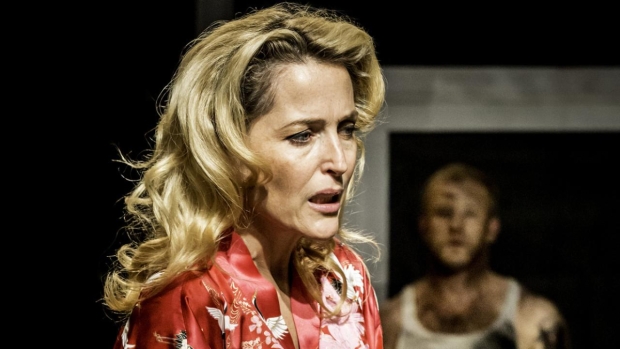Gillian Anderson on starring in A Streetcar Named Desire: 'It's an epic deconstruction of genius'

© Johan Persson
In the summer of 2014, Gillian Anderson finally had the opportunity she desired for a great many years: She got to play Blanche DuBois in Tennessee Williams' A Streetcar Named Desire. Benedict Andrews directed the production at London's Young Vic Theatre, which also featured Ben Foster as Stanley and Vanessa Kirby as Stella. The run quickly sold out, no doubt owing in part to the star power of the X-Files icon.
From Thursday, it is being streamed for free on the National Theatre's YouTube channel for a week.
When did you first say to yourself "I want to play Blanche DuBois?"
It's been rattling around in my head for a few decades. It was only after I started actually working on the dialogue that I realized that I had spent time with the text before. My mother reminded me that when I was 16, I did one of the monologues for a forensic competition. It must have been that moment of working on that text that somehow lodged [it] inside the cells of my being. When people have said, "If you could do any piece of theatre what would it be?" I've always said "Streetcar, Streetcar, Streetcar."
After the London run ended in 2014, did you feel like you still had unfinished business with Blanche?
Good question. No, I didn't. And yet, in the rehearsal process for the New York run, I'm still going, "Oh my god, I didn't see that period there. That changes the meaning of the word and the rhythm of the sentence."
In our adaptation of the play, which is approved but isn't necessarily in the Penguin [published] book, I had found that Blanche says, "I want. Magic." It's not "I want magic." Where she's at right there in her journey, it's such a desperate statement. She's about to reveal that she's a pathological liar and excuses it by what she says: "I don't want realism" period "I want" period "Magic."
There's a lot of that. I imagine with this kind of extraordinary text that you're never done with the dig. It's an epic deconstruction of genius, and you can't not continue to find nuggets in there.
How do you and your cast mates stay grounded when you're doing a play as intense a play as this?
When one agrees to jump on the Streetcar, you are subjecting yourself to something very specific. There are plenty of plays that ask of the actors everything they've got. It is unique in some ways, and part of that is the state of mind of the characters on the stage and how to stay focused and grounded and sane, dare I say, through the process of doing it day after day, multiple times, even in rehearsal. We're a very tight, caring group. It ultimately comes down to getting enough sleep and eating well and taking care of yourself, and just being prepared.
In the end, does playing Blanche DuBois mean that you get to finally scratch Streetcar off your bucket list?
This is my bucket list. After doing a piece of material like this, it does spoil you. All of a sudden, it's like, "OK, if the pot is that small of what there is to choose from, in terms of that quality of classical work, but also at my age, do I need to be clearer about what those [roles] are, so I can map it out and don't go, "Oh, no, I've missed it?" It's now a bucket list that she will always be at the top of.
What was it like to come back to the play after a year and a half for the New York run?
I've never had this experience before, going back to something that has a text that is memorized. I've gone back to characters, but not to something that is verbatim. That's an interesting journey, the journey of the brain and memory and what one holds on to. And also, the process of coming back to something that worked, and taking that information and expanding on it, rather than adjusting something that doesn't need to be adjusted. That's something Benedict [Andrews], our director, is very good at. We're going back to the text and picking up on things we missed before. It really does feel like a creative process, not just "OK, do it again."
This article was originally published on WhatsOnStage's sister site TheaterMania










